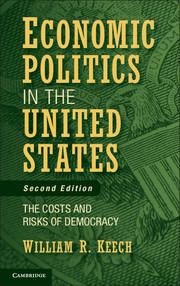Book contents
- Frontmatter
- Contents
- List of Figures and Tables
- Preface to the Second Edition
- Preface to the First Edition
- Part One Introduction
- Part Two Models of Macroeconomic Politics in a Democracy
- Part Three The Sources and Authority of Macroeconomic Goals
- 6 The Authority of Macroeconomic Goals
- 7 Voters, Elections, Accountability, and Choice
- Part Four Institutions and Processes
- Part Five Conclusion
- References
- Index
7 - Voters, Elections, Accountability, and Choice
Published online by Cambridge University Press: 05 June 2014
- Frontmatter
- Contents
- List of Figures and Tables
- Preface to the Second Edition
- Preface to the First Edition
- Part One Introduction
- Part Two Models of Macroeconomic Politics in a Democracy
- Part Three The Sources and Authority of Macroeconomic Goals
- 6 The Authority of Macroeconomic Goals
- 7 Voters, Elections, Accountability, and Choice
- Part Four Institutions and Processes
- Part Five Conclusion
- References
- Index
Summary
Voters are the ultimate authority in a democracy. Their preferences and behaviors are the fundamental sources of legitimacy for policy makers, who get their power through elections. Their preferences and behaviors also place constraints on what elected politicians can do. The electorate is the source for the authority of constitutional rules of procedure and for the authority of official statements of public goals. When there is ambiguity about what goals are appropriate for public policy, voter choices can resolve it at least provisionally. When there is ambiguity about which potential officeholders have correct or appropriate beliefs about the way the economic world works, voter choices can determine which ones will get to test their views against experience.
All this would be true in a world of ideal democratic citizens, but it is true in the real world as well. Yet the effort by candidates for office to maximize their share of the votes of even ideal citizens can lead to opportunism, according to some of the models of political economy we have reviewed. Whereas ideal citizens may be public spirited and fully informed, real-world voters may not have either of these qualities. This chapter will assess what we know about how voting behavior is affected by macroeconomic issues, as well as the implications for policy making. It will also raise some questions about how voter behavior may have contributed to the poor contemporary state of American political economy.
- Type
- Chapter
- Information
- Economic Politics in the United StatesThe Costs and Risks of Democracy, pp. 155 - 176Publisher: Cambridge University PressPrint publication year: 2013

